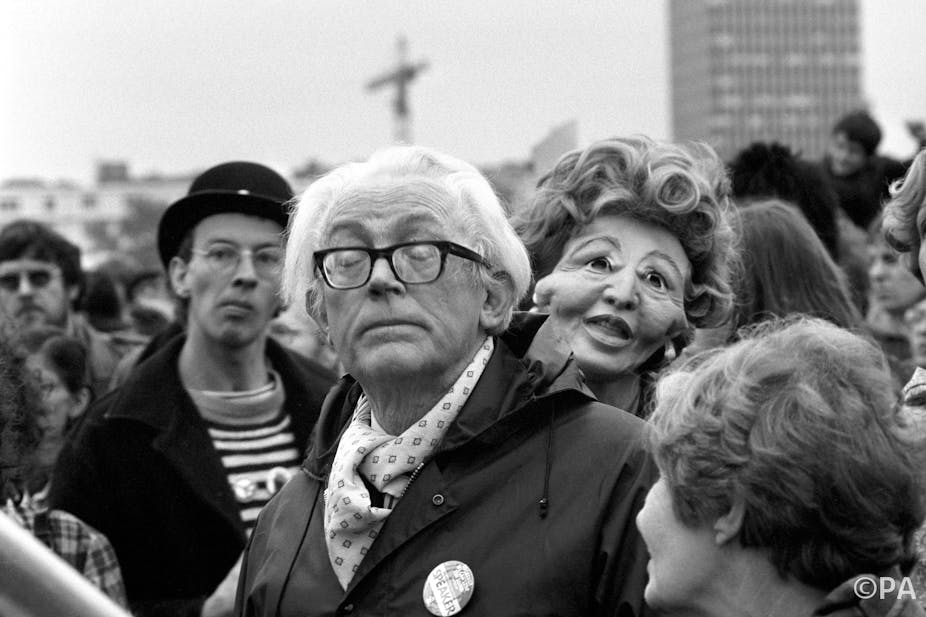As the Labour Party begins its leadership contest, it may be a faux pas to mention Karl Marx. But many party members must be thinking of his observation that everything in history happens twice – the first time as tragedy, the second as farce.
Take Labour’s current predicament: an elderly, leftist leader faces a new Conservative Prime Minister. He is burdened by divisions over his own competence, his policy on Europe, the economy and defence, and wrangling over his party’s constitution. Change Jeremy Corbyn for Michael Foot, Theresa May for Margaret Thatcher and have the nation enthralled by Brideshead Revisited instead of Downton Abbey and you’re back in 1981.
The Labour Party is in some ways better off today than in 1981; in others, worse. Either way, the resonance is not a good sign for the opposition in the near future.
Divided again
Foot, the Labour Leader in 1981, was on the anti-nuclear, anti-European wing of the party. And, like Corbyn, he was mocked for his dress sense and eccentric demeanour.
The issues of Europe, the economy and defence divided the party then, as now. Back then is was Polaris rather than trident, tax increases rather than wage ratios, and the EEC instead of the EU.
Yes, the intensity of the debate is less toxic today than it was back then. The absence of the threat of spontaneous superpower conflict takes some of the urgency and purism out of the nuclear debate; the economic context has been comprehensively reconfigured by Thatcherism; and on Europe almost all Labour MPs, including the leader, and most Labour voters, supported membership.
The policy issues are always difficult for Labour, but not more so today than on many occasions in the past.
Foot was, though, in a far stronger position than Corbyn. He had won the votes of the majority of Labour MPs the previous autumn, and 29 of his (presumed) opponents subsequently left to form the SDP, strengthening his position among those who remained.
He was also a more credible figure than Corbyn in terms of service in office. Foot had shown loyalty to cabinet colleagues as a senior minister, so much so that his chief rival, former chancellor Denis Healey was prepared to take up the position of deputy leader. Corbyn has fewer years in parliament, none as a minister and four out of five of his MPs have declared against him. He cannot populate a shadow cabinet. In that sense, the crisis is undoubtedly more serious.
A question of constitution
The argument about the party’s constitution is certainly as serious as it was on 1981, if not more so. Back then, the issue was complicated. First, there was the question of whether the extra-parliamentary party should have any role at all in leadership elections (a novelty in those days); and thereafter whether the trade unions should have a discrete role in the election, or whether a postal ballot of all full members should be used.
The left won a guaranteed role for union block votes in elections. This triggered the split which led to the formation of the SDP. It was the final straw for those MPs who were already distressed by Foot’s leadership and the party’s direction of travel.

Labour now faces a similar conflict of opinion, made worse by the need to hold a leadership election using a system which highlights the divisions in the party. It has always been possible for ordinary party members to choose a leader that MPs wouldn’t like, but other parties haven’t fallen into quite such a hole as a result.
This was visibly true of Iain Duncan Smith when he became Tory Leader in 2001. But the Conservatives have a mechanism for removing a leader not accepted by their MPs – and a membership deferential enough to accept it.
Labour members now face an unenviable dilemma: do they dethrone the leader they put in place so emphatically (through all sections of the Party, not just the new registered supporters) and thereby accept that the PLP are the real decision-makers? Or do they defy the Labour MPs who represent millions of the party’s voters, and the potential voters with whom Corbyn is apparently unpopular, and risk a split in the Party like the one of 1981?
The SDP project sliced nine points off an already losing Labour share of the vote from the 1979 election. Labour did not win again until Tony Blair, advised by SDP founder Roy Jenkins, led it to victory in 1997. It is perhaps Labour’s best hope now that there is no Roy Jenkins or any other credible-looking former Labour ministers waiting in the wings to start a new party. Yet.

